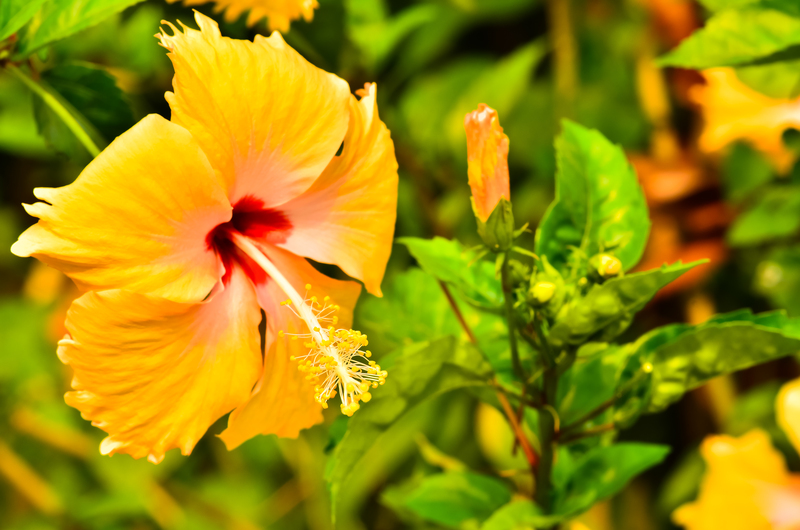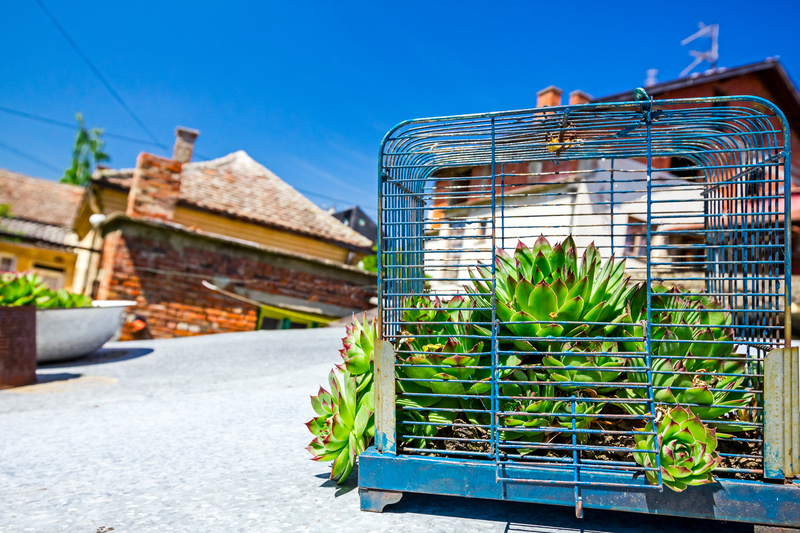Exploring the Basics of Container Gardening
Posted on 18/08/2025
Exploring the Basics of Container Gardening
Container gardening has revolutionized the way people grow plants by allowing garden enthusiasts of any skill level or physical space to cultivate flowers, vegetables, and herbs. Whether you live in an apartment with a small balcony, a home with limited yard space, or simply want to add flare to your landscape, container gardening offers versatility, convenience, and creativity.
This comprehensive guide will take you through everything you need to know about starting and maintaining a successful container garden. From understanding which containers are best, to choosing the right soil, and picking out your plants, we'll delve into the key aspects of container gardening for beginners and seasoned gardeners alike.

What is Container Gardening?
Container gardening refers to growing plants exclusively in pots or other containers rather than planting them directly into the ground. This method has soared in popularity for a number of reasons:
- Space Efficiency: Ideal for urban gardens, patios, corridors, balconies, and rooftops.
- Mobility: Easily rearrange or move plants to cater to sun, shade, or weather changes.
- Versatility: Grow everything from ornamental flowers and ferns to food crops and shrubs.
- Pest and Disease Management: Reduce risk of soil-borne diseases and control pests better.
- Accessibility: Perfect for gardeners with physical limitations since containers can be placed on tables or stands.
With container gardening, you can design a miniature garden anywhere--even on a tiny windowsill.
Benefits of Container Gardening
1. Flexibility in Plant Choices
Experiment with exotic or classic varieties that might not thrive in your local ground soil.
2. Improved Soil Quality Control
Customize soil blends for each type of plant, leading to better health and stronger growth.
3. Enhanced Decorative Appeal
Containers come in endless sizes, shapes, and colors, allowing you to create unique displays suitable for every style and space.
4. Less Physical Labor
There's no digging, weeding, or double-digging--ideal for people who want to garden without heavy lifting.
5. Water Conservation
Watering is focused on the plants rather than the entire garden bed, resulting in less waste.
Getting Started with Container Gardening
To ensure success with your container gardening projects, start by focusing on the following basics:
Choosing the Right Containers
The container is a critical component of your garden. Here's what you need to consider:
-
Material:
- Terracotta: Classic and attractive, but can dry out quickly.
- Ceramic: Glazed ceramics retain moisture well and come in various designs.
- Plastic: Lightweight, affordable, and easy to move, but may fade in sun.
- Wood: Natural look; ensure wood is treated against rot.
- Metal: Modern and stylish, but can become hot in direct sunlight and needs good drainage.
- Size: The size of the container impacts the growth potential of your plants. Generally, larger containers retain moisture better and allow roots more space. Match the pot size to your plant's mature size.
- Drainage: Always choose containers with adequate drainage holes. Good drainage is vital for plant health and helps prevent root rot.
Picking the Perfect Soil
Soil is the lifeblood of container gardening. It affects everything from moisture retention to nutrient availability. Avoid using regular garden soil, as it may be too dense or harbor pests. Instead, opt for a high-quality potting mix specifically designed for container-grown plants. These blends are lighter and ensure better drainage and air flow around the roots.
- Soilless Mixes: Often contain peat moss, perlite, and vermiculite. Great for moisture management and minimizing pests or diseases.
- Organic Amendments: Add compost, worm castings, or coconut coir for extra nutrients and improved structure.
- Specialized Mixes: For certain plants (like succulents or orchids), specialized potting mediums can be purchased.
Selecting the Best Plants for Containers
The type of plant you choose for your container garden depends on your climate, space, and preferences. Here are some popular options:
- Herbs: Basil, mint, thyme, rosemary, chives, oregano
- Vegetables: Tomatoes, peppers, lettuce, spinach, radishes, beans
- Flowers: Petunias, marigolds, pansies, begonias, geraniums
- Fruits: Strawberries, dwarf blueberries, small citrus trees
- Ornamental Plants: Ferns, succulents, decorative grasses, small shrubs
Choose compact varieties or those specifically bred for containers to maximize success. Check plant tags for mature size and light requirements before buying.
Container Garden Maintenance Basics
Watering Wisely
Plants in containers require more attentive watering than those grown in the ground. Factors affecting watering frequency include container size, plant type, weather, and exposure to sun or wind.
- Check Daily: Stick your finger one inch into the soil; if it feels dry, water thoroughly.
- Water Evenly: Water until it drains from the bottom. Avoid letting containers sit in standing water.
- Mulch: Adding mulch on top of the potting mix helps retain moisture and reduces temperature fluctuations.
Feeding Your Container Plants
Container-grown plants have limited access to nutrients, making regular feeding crucial. Use a balanced, slow-release fertilizer when planting and supplement with liquid fertilizer during the growing season, following package directions.
- Herbs: Light feeders; fertilize monthly with a diluted solution.
- Veggies & Annuals: Heavy feeders; fertilize every 2-3 weeks.
- Flowering Plants: Use a bloom-boosting fertilizer for abundant blossoms.
Managing Pests and Diseases
Monitor your container garden regularly for signs of pests such as aphids, mites, and slugs. Early detection is key. Use organic sprays, neem oil, or handpicking to address issues without harming beneficial insects.
Disease prevention tips:
- Avoid overhead watering to reduce fungal infections.
- Inspect new plants for signs of pests before introducing them.
- Clean and disinfect containers before reusing.
Pruning and Deadheading
Regularly prune and deadhead to encourage new growth and keep plants looking their best. Remove spent flowers and yellowing leaves with clean scissors to foster healthy, bushy growth.
Creative Ideas for Your Container Garden
Vertical Gardening
Make the most of a small space by growing upwards. Use stacked pots, trellises, or wall-mounted planters to display herbs, strawberries, or vining plants like peas and beans.
Themed Container Gardens
- Herb Garden: Group culinary herbs with similar watering needs in a large trough.
- Salad Bowl: Plant lettuces, spinach, and edible flowers together for a ready-to-harvest salad garden.
- Pollinator Paradise: Fill containers with nectar-rich blooms like lavender, zinnias, and bee balm to attract butterflies and bees.
- Succulent Dish: Arrange a variety of succulents in a shallow bowl for a low-maintenance display.
Seasonal Interest
Change plants with the seasons. Try spring bulbs like tulips or daffodils; switch to summer annuals; finish the year with ornamental cabbages, kales, and winter pansies.
Common Mistakes in Container Gardening
Even seasoned growers run into trouble. Here are a few mistakes to avoid in your container growing journey:
- Overwatering or Underwatering: Lack of drainage and irregular watering harm plant roots. Check soil moisture frequently.
- Poor Placement: Not all plants thrive in the same light or wind conditions. Match each plant's needs to its spot.
- Overcrowding: Cramming too many plants into a pot leads to competition and poor growth. Give roots space to expand.
- Neglecting Fertilization: Container soils lose nutrients faster than gardens; fertilize consistently.
- Choosing the Wrong Container: Containers that are too small, lack drainage, or overheat in the sun lead to failed projects.

Frequently Asked Questions about Container Gardening
How often should I water my container garden?
Typically, containers need watering every 1-2 days in hot weather, especially for vegetable or flower-filled pots. Always check soil moisture before watering.
What's the best fertilizer for potted plants?
A balanced, water-soluble fertilizer or a slow-release granular fertilizer works well for most container plants. Follow the manufacturer's instructions regarding frequency and quantity.
Can I reuse potting soil?
You can reuse potting mix if it's free of disease and thoroughly refreshed. Amend with fresh compost and slow-release fertilizer at the start of a new planting cycle.
What vegetables grow best in pots?
Tomatoes (dwarf types), salad greens, radishes, peppers, lettuces, and bush beans excel in containers. Choose varieties bred for compact growth.
How do I improve drainage in heavy containers?
Use a high-quality commercial potting mix, ensure drainage holes are clear, and elevate pots on pot feet or bricks for extra air circulation.
Conclusion: Embark on Your Container Gardening Journey
Container gardening is one of the easiest and most rewarding ways to bring green life into any home, balcony, or small space. With careful attention to containers, soil, plant choice, and maintenance practices, anyone can create a thriving oasis--regardless of experience or yard size.
Start small with just one or two pots, or go all-in with a lush patio filled with your favorite flowers and veggies. Let your creativity blossom, experiment with designs, and enjoy the fresh flavors and vibrant colors that container gardening has to offer. Happy planting!
Ready to begin? Share your container gardening stories, questions, and tips in the comments below and join a community of enthusiastic gardeners transforming their spaces--one pot at a time!
Latest Posts
Transforming Organic Waste into Soil Fertility
Beginner's Guide to Thriving Herb Gardens
Designing a Magical Garden for Young Explorers

